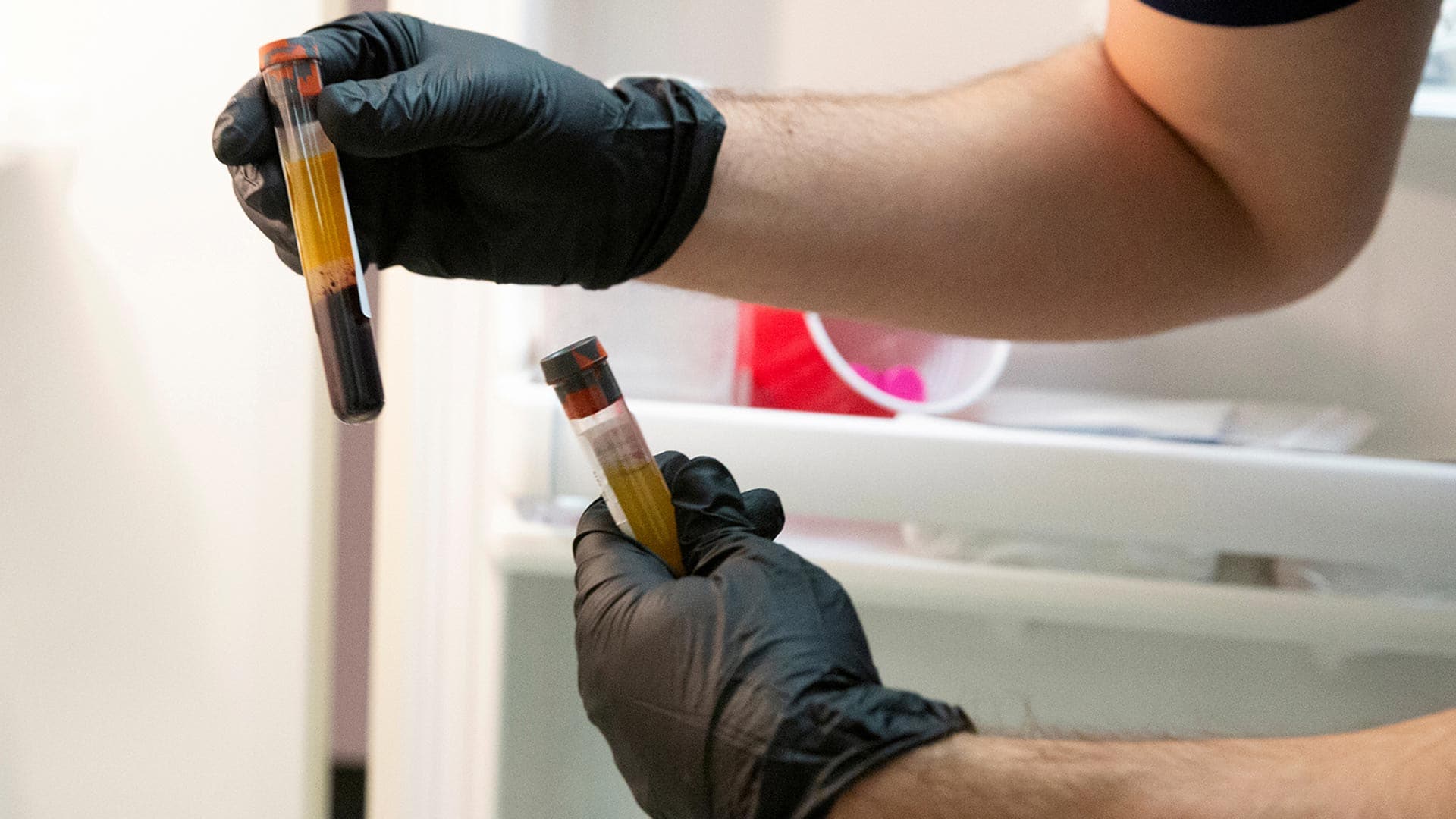News
Coronavirus in Canada and around the world on Wednesday
|
|
The latest:
Manitoba’s health system still has capacity and is not yet at its breaking point, the health minister said Tuesday as the number of active COVID-19 cases and hospitalizations increased.
The province reported 184 new cases — a new daily record — and three new deaths on Tuesday. Hospitalizations increased to 83, while ICU numbers stayed steady at 15.
Health Minister Cameron Friesen said the province is bringing in extra contact tracers through an agreement with the Red Cross and is planning for all scenarios, including the possibility of moving less severe patients and cancelling elective surgeries.
“If the numbers continue to go in the wrong direction on COVID-19, then we have to think about how we would curtail those in order to keep people safe and be able to concentrate our efforts elsewhere,” he said.
The question of how health systems will cope with a second wave is not just an issue in Manitoba. The Canadian Medical Association released a study this week looking at the impact of the first wave of COVID-19 on six procedures, including CT and MRI scans, knee and hip replacements and cataract surgery.
Dr. Ann Collins, president of the national association of physicians, said Canadians could “very well see a backlog on a backlog if we do not start addressing it, given what we are very possibly looking at with a second wave.”
What’s happening in Canada
WATCH | Why 2 provinces haven’t adopted COVID Alert app:


Only five million Canadians have downloaded the COVID Alert app in three months, partly because it’s not active in Alberta and British Columbia. Officials in B.C. want the app to give more information about COVID-19 exposure while Alberta has been delayed by its own app. 1:57
As of 7 a.m. ET on Wednesday, Canada had 222,887 confirmed or presumptive coronavirus cases. Provinces and territories listed 186,464 of those as recovered or resolved. A CBC News tally of deaths based on provincial reports, regional health information and CBC’s reporting stood at 10,001.
British Columbia announced 217 new COVID-19 cases on Tuesday, bringing the number of active cases in the province up to 2,322. There were 84 people hospitalized, with 27 in the ICU.
Alberta reported 422 new cases on Tuesday, bringing the number of active cases in the province to 4,738. Hospitalizations ticked up to to 123, with ICU numbers steady at 16.
In Saskatchewan, Premier Scott Moe said Tuesday that targeted measures focused on COVID-19 in bars and nightclubs could come this week after dozens of cases were linked to several bars and clubs. The province reported 58 new cases of COVID-19 on Tuesday, bringing the number of active cases to 652. Health officials reported 24 hospitalizations, with six in ICU.
Ontario’s premier said he’s accepted the apology of a Niagara-area MPP who has faced criticism after being captured in a close group photo at an indoor event in which nobody wore masks. “Everyone makes mistakes. He apologized. He’s not going to do it again,” Doug Ford said of Sam Oosterhoff.
Ontario reported 827 new cases of COVID-19 on Tuesday and four new deaths due to the virus. In total, 312 people are hospitalized in Ontario due to COVID-19, including 75 in intensive care.
In Quebec, Premier François Legault, who recently extended COVID-19 restrictions in hard-hit regions of the province, defended his government Tuesday against an opposition charge that mixed messaging around public health restrictions is sowing unrest in the province.
Quebec reported 963 new COVID-19 cases, and 19 new deaths — with four of the deaths reported in the past 24 hours, 14 dating back to last week and one from an unknown date. The number of patients in hospital declined by 16 to 527 while the number of intensive-care patients dropped by two to 91.


A new study out of the U.K. has found COVID-19 antibodies can disappear quickly from people who’ve had the virus, which experts say makes herd immunity unlikely without a vaccine. 3:33
The Atlantic provinces saw some increases in COVID-19 cases on Tuesday, with New Brunswick reporting three new cases in the Campbellton region, bringing the total number of active cases in the province to 55. Nova Scotia reported one new case, saying the individual had travelled outside Atlantic Canada and was self-isolating.
There were no new cases reported in Prince Edward Island or Newfoundland and Labrador.
In the North, there were no new confirmed cases in Yukon or Nunavut. In the Northwest Territories officials reported a presumptive positive case in Inuvik, but said in a statement that public health “has determined there is no risk to the public as the individual has been self-isolating appropriately since returning from travel.”
What’s happening around the world


Several clinical trials are trying to determine whether vitamin D could be effective in helping to treat or prevent COVID-19, while a new study shows many patients in a Spanish hospital had a vitamin D deficiency. 1:58
A database maintained by U.S.-based Johns Hopkins University tracking COVID-19 cases worldwide stood at more than 44 million cases worldwide as of Wednesday morning, with more than 29.8 million considered resolved. The number of deaths reported around the world stood at more than 1.1 million.
In the Americas, nearly half a million people have contracted COVID-19 in the United States over the last seven days, according to a Reuters tally, as new cases and hospitalizations set records in the Midwest.
Mexico City Mayor Claudia Sheinbaum said on Tuesday she had tested positive for COVID-19 but was feeling well and had not developed symptoms of the disease.


The situation in Europe, where coronavirus infections are surging, is “serious and alarming” and the bloc must be more efficient with testing, contact tracing, vaccine and quarantine policies, the EU Council president said.
“We need more efficiency in intercepting [the virus] before citizens infect each other. We need strong planning. Otherwise we will have systematic lockdowns in coming months,” Charles Michel told Italian daily La Stampa in an interview published on Wednesday.
Italy, which pledged more than €5 billion (roughly $7.7 billion Cdn) in new support measures for businesses hit by the latest restrictions, has seen repeated clashes between police and protesters in cities from Naples to Turin as well as bitter criticism from restaurant owners and business groups.


Police move in on supporters of a far-right party protesting anti-COVID-19 measures in Rome, one of several demonstrations across Italy over the past week. 3:52
In the Asia-Pacific region, India’s tally of confirmed coronavirus cases moved closer to eight million, with 43,893 new cases reported in the latest 24-hour period.
The total reported Wednesday includes the highest single-day number of cases for New Delhi, the Indian capital — 4,853. The Health Ministry also reported 508 fatalities from COVID-19 across India in the past 24 hours, raising the total to 120,010.
Authorities in Sri Lanka have closed several museums as a new wave of coronavirus cases is detected in different parts of the country.
In the Middle East, the Iranian government said people are being too lax in complying with restrictions, as the hardest-hit Middle Eastern country faced new daily records of infections and deaths.
South Africa remained the hardest-hit country in Africa, with nearly 718,000 reported cases and more than 19,000 deaths.
Source: cbc.ca
News
Fires in Happy Valley-Goose Bay under control with no current risk of explosion – CBC.ca


A statement released Saturday morning from Happy Valley-Goose Bay RCMP says the fires in the town and on the Canadian Forces Base are now under control and there is no risk of explosion.
As well, Mayor George Andrews announced that the state of emergency has been lifted and evacuated residents are now permitted to return to their homes.
“We implore the general public to remain away from the area as we have firefighters and other first responders at the scene in the coming hours and days,” Andrews said.
“And we just ask the public not to engage in any activity up around the Canadian side,” he said, referring to the North side of the community.
The police say firefighters battled the blaze, which caused extensive damage to a number of commercial structures, throughout the night. No one was injured.
A fire broke out in a former airport hangar in Happy Valley-Goose Bay late Friday, which sparked a number of explosions as well as an evacuation and an official state of emergency.
Andrews says the fire department was assisted by a number of groups, including the military.
“Early this morning our firefighters stood down a little,” Andrews told CBC News on Saturday. “We have a crew here who are battling some hotspots.”
“This looks to me to be a predominantly clean up site,” Andrews said, regarding the damage caused by the fire. “Now, we will be probably on-site here for a number of days because of just the sheer heat and things within that old hanger. If you can imagine, this is a huge old military aircraft hanger.”
“The fire started in a couple of buildings that were on the back of an old hanger that sits at the airfield on the north side,” said Andrews. “It caused the the hanger that was next door to be engulfed… That hanger is not there anymore.”
Andrews said it’s too early to determine what caused the fire.
“This was a huge, huge effort on behalf of all our emergency services which were engaged and our crews fought very hot, very uncomfortable conditions through the night,” he said.
Download our free CBC News app to sign up for push alerts for CBC Newfoundland and Labrador. Click here to visit our landing page.
News
Canada Child Benefit payment on Friday | CTV News – CTV News Toronto


More money will land in the pockets of Canadian families on Friday for the latest Canada Child Benefit (CCB) installment.
The federal government program helps low and middle-income families struggling with the soaring cost of raising a child.
Canadian citizens, permanent residents, or refugees who are the primary caregivers for children under 18 years old are eligible for the program, introduced in 2016.
The non-taxable monthly payments are based on a family’s net income and how many children they have. Families that have an adjusted net income under $34,863 will receive the maximum amount per child.
For a child under six years old, an applicant can annually receive up to $7,437 per child, and up to $6,275 per child for kids between the ages of six through 17.
That translates to up to $619.75 per month for the younger cohort and $522.91 per month for the older group.
The benefit is recalculated every July and most recently increased 6.3 per cent in order to adjust to the rate of inflation, and cost of living.
To apply, an applicant can submit through a child’s birth registration, complete an online form or mail in an application to a tax centre.
The next payment date will take place on May 17.
News
Capital gains tax change draws ire from some Canadian entrepreneurs worried it will worsen brain drain – CBC.ca
A chorus of Canadian entrepreneurs and investors is blasting the federal government’s budget for expanding a tax on the rich. They say it will lead to brain drain and further degrade Canada’s already poor productivity.
In the 2024 budget unveiled Tuesday, Finance Minister Chrystia Freeland said the government would increase the inclusion rate of the capital gains tax from 50 per cent to 67 per cent for businesses and trusts, generating an estimated $19 billion in new revenue.
Capital gains are the profits that individuals or businesses make from selling an asset — like a stock or a second home. Individuals are subject to the new changes on any profits over $250,000.
The government estimates that the changes would impact 40,000 individuals (or 0.13 per cent of Canadians in any given year) and 307,000 companies in Canada.
However, some members of the business community say that expanding the taxable amount will devastate productivity, investment and entrepreneurship in Canada, and might even compel some of the country’s talent and startups to take their business elsewhere.
Finance Minister Chrystia Freeland unveiled the government’s 2024 federal budget, with spending targeted at young voters and a plan to raise capital gains taxes for some of the wealthiest Canadians.
Benjamin Bergen, president of the Council of Canadian Innovators (CCI), said the capital gains tax has overshadowed parts of the federal budget that the business community would otherwise be excited about.
“There were definitely some other stars in the budget that were interesting,” he said. “However, the … capital gains piece really is the sun, and it’s daylight. So this is really the only thing that innovators can see.”
The CCI has written and is circulating an open letter signed by more than 1,000 people in the Canadian business community to Trudeau’s government asking it to scrap the tax change.
Shopify CEO Tobi Lütke and president Harley Finkelstein also weighed in on the proposed hike on X, formerly known as Twitter.
We need to be doing everything we can to turn Canada into the best place for entrepreneurs to build 🇨🇦<br><br>What’s proposed in the federal budget will do the complete opposite. Innovators and entrepreneurs will suffer and their success will be penalized — this is not a wealth tax,…
—@harleyf
Former finance minister Bill Morneau said his successor’s budget disincentivizes businesses from investing in the country’s innovation sector: “It’s probably very troubling for many investors.”
Canada’s productivity — a measure that compares economic output to hours worked — has been relatively poor for decades. It underperforms against the OECD average and against several other G7 countries, including the U.S., Germany, U.K. and Japan, on the measure.
Bank of Canada senior deputy governor Carolyn Rogers sounded the alarm on Canada’s lagging productivity in a speech last month, saying the country’s need to increase the rate had reached emergency levels, following one of the weakest years for the economy in recent memory.
The government said it was proposing the tax change to make life more affordable for younger generations and fund efforts to boost housing supply — and that it would support productivity growth.
A challenge for investors, founders and workers
The change could have a chilling effect for several reasons, with companies already struggling to access funding in a high interest rate environment, said Bergen.
He questioned whether investors will want to fund Canadian companies if the government’s taxation policies make it difficult for those firms to grow — and whether founders might just pack up.
The expanded inclusion rate “is just one of the other potential concerns that firms are going to have as they’re looking to grow their companies.”


He said the rejigged tax is also an affront to high-skilled workers from low-innovation sectors who might have taken the risk of joining a startup for the opportunity, even taking a lower wage on the chance that a firm’s stock options grow in value.
But Lindsay Tedds, an associate economics professor at the University of Calgary, said the tax change is one of the most misunderstood parts of the federal budget — and that its impact on the country’s talent has been overstated.
“This is not a major innovation-biting tax change treatment,” Tedds said. “In fact, when you talk to real grassroots entrepreneurs that are setting up businesses, tax rates do not come into their decision.”
As for productivity, Tedds said Canadians might see improvements in the long run “to the degree that some of our productivity problems are driven by stresses like housing affordability, access to child care, things like that.”
‘One foot on the gas, one foot on the brake’
Some say the government is sending mixed messages to entrepreneurs by touting tailored tax breaks — like the Canada Entrepreneurs’ Incentive, which reduces the capital gains inclusion rate to 33 per cent on a lifetime maximum of $2 million — while introducing measures they say would dampen investment and innovation.
“They seem to have one foot on the gas, one foot on the brake on the very same file,” said Dan Kelly, president of the Canadian Federation of Independent Business.
Some business groups are worried that new capital gains tax changes could hurt economic growth. But according to Small Business Minister Rechie Valdez, most Canadians won’t be impacted by that change — and it’s a move to create fairness.
A founder may be able to sell their successful company with a lower capital gains treatment than otherwise possible, he said.
“At the same time, though, big chunks of it may be subject to a higher rate of capital gains inclusion.”
Selling a company can fund an individual’s retirement, he said, which is why it’s one of the first things founders consider when they think about capital gains.
Mainstreet NS7:03Ottawa is proposing a hike to capital gains tax. What does that mean?
Tuesday’s federal budget includes nearly $53 billion in new spending over the next five years with a clear focus on affordability and housing. To help pay for some of that new spending, Ottawa is proposing a hike to the capital gains tax. Moshe Lander, an economics lecturer at Concordia University, joins host Jeff Douglas to explain.
Dennis Darby, president and CEO of Canadian Manufacturers & Exporters, says he was disappointed by the change — and that it sends the wrong message to Canadian industries like his own.
He wants to see the government commit to more tax credit proposals like the Canada Carbon Rebate for Small Businesses, which he said would incentivize business owners to stay and help make Canada competitive with the U.S.
“We’ve had a lot of difficulties attracting investment over the years. I don’t think this will make it any better.”
Tech titan says change will only impact richest of the rich


Toronto tech entrepreneur Ali Asaria will be one of those subject to the expanded capital gains inclusion rate — but he says it’s only fair.
“It’s going to really affect the richest of the rich people,” Asaria, CEO of open source platform Transformer Lab and founder of well.ca, told CBC News.
“The capital gains exemption is probably the largest tax break that I’ve ever received in my life,” he said. “So I know a lot about what that benefit can look like, but I’ve also always felt like it was probably one of the most unfair parts of the tax code today.”
While Asaria said Canada needs to continue encouraging talent to take risks and build companies in the country, taxation policies aren’t the most major problem.
“I think that the biggest central issue to the reason why people will leave Canada is bigger issues, like housing,” he said.
“How do we make it easier to live in Canada so that we can all invest in ourselves and invest in our companies? That’s a more important question than, ‘How do we help the top 0.13 per cent of Canadians make more money?'”
-
Real eState17 hours ago
Botched home sale costs Winnipeg man his right to sell real estate in Manitoba – CBC.ca
-
News23 hours ago
Canada Child Benefit payment on Friday | CTV News – CTV News Toronto
-
Business17 hours ago
Dow Jones Rises But S&P, Nasdaq Fall; Nvidia, SMCI Flash Sell Signals As Bitcoin's Fourth Halving Arrives – Investor's Business Daily
-



 Science15 hours ago
Science15 hours agoDragonfly: NASA greenlights most important mission of the century – Earth.com
-



 Science22 hours ago
Science22 hours agoMarine plankton could act as alert in mass extinction event: UVic researcher – Langley Advance Times
-
Art16 hours ago
Art and Ephemera Once Owned by Pioneering Artist Mary Beth Edelson Discarded on the Street in SoHo – artnet News
-



 Tech22 hours ago
Tech22 hours agoNothing Ear And Nothing Ear (a) Earbuds Are 1st With ChatGPT Integration – Forbes
-



 Investment22 hours ago
Investment22 hours agoJohn Ivison: The blowback to Trudeau's investment tax hike could be bigger than he thinks – National Post







